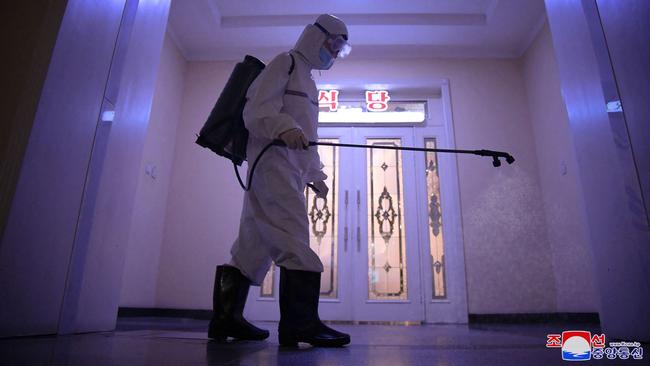North Korea blames ‘alien things’ from South for Covid-19 outbreak
State media says virus-tainted balloons sent over the border infected two people.

North Korea has claimed its first Covid-19 outbreak began after two people touched “alien things”, blaming exposure to what state media said were virus-tainted balloons sent over the border from South Korea.
An 18-year-old soldier and a five-year-old kindergarten pupil contracted the virus in early April after coming in contact with materials that had travelled by wind or were carried by balloons in the border area, state media said at the weekend. The conclusions were from an investigation carried out by North Korean medical experts. The two people had contracted the virus in the southeastern province of Kangwon, which shares a border with South Korea.
Several people travelling from Kangwon province to the capital, Pyongyang, in mid-April reported fever symptoms, igniting a nationwide outbreak, state media said. Since first admitting it had Covid transmissions in May, North Korea has reported around 4.7 million fever cases and 73 deaths. In recent weeks, North Korea claimed its Covid wave was subsiding, though health experts suspect they are under-reporting figures, especially on deaths.
Following the Covid investigation, the North ordered people to “vigilantly deal with alien things coming by wind and other climate phenomena and balloons in the areas along the demarcation line and borders”, state media said
Activist groups led by defectors in South Korea for decades have flown balloons across the border carrying anti-regime leaflets and humanitarian aid. In June, Fighters for Free North Korea, a Seoul-based group, flew balloons carrying Covid aid such as face masks and pain-relief drugs across the border. The balloons sent by defector groups typically travel more than 200km to cross the border.
The chances of the virus surviving on surfaces such as a balloon or leaflets are “essentially impossible”, said Kim Dong-hyun, a professor at South Korea’s Hallym University College of Medicine. “North Korea’s claims are nonsense,” said Dr Kim.
The Kim Jong-un regime’s intention is to make North Korean citizens think the virus entered through South Korean leaflets to justify heavily punishing people in the border area from coming in contact with anti-regime information, said Cheong Seong-chang, director of the Centre for North Korean Studies at the Sejong Institute in South Korea.
“By shifting the blame on South Korea, North Korea will likely respond strongly to balloons sent by defectors’ groups, raising tensions on the Korean Peninsula.”
In 2014, North Korean soldiers attempted to shoot the balloons down, leading to an exchange of fire across the border.
North Korea watchers say the virus likely entered the country through a different route. Early this year, the country temporarily reopened a rail link with China. Satellite images showed traffic at North Korea’s main port of Nampo, in violation of UN sanctions.
China and Russia have also reported numerous Covid outbreaks near their borders with North Korea since 2020. In June, an outbreak in the Chinese border city of Dandong prompted officials there to say they suspected wind blowing in from North Korea may have carried the virus in.
The Kim regime has long criticised the leafleting campaigns, especially those led by defectors whom state media has referred to as “human scum”. In June 2020, Pyongyang grew so angry over the leaflets it threatened to take inter-Korean ties to their “worst phase” unless South Korea blocked the defector groups from flying the border-crossing balloons. Shortly after, North Korea cited the leaflets as the reason for blowing up a joint liaison office.
South Korea eventually passed an anti-leaflet law, which came into effect in March 2021 and has been criticised by human rights groups for curbing free speech in an effort to improve ties with the North. Despite the new law, the Fighters for Free North Korea in late April sent leaflets in balloons from a western South Korean city not far from the border. But the “alien things” North Korea suspected brought in Covid had affected people from the eastern part of the country – and did so in early April, state media said.
Any suggestion the leaflets brought in Covid are just attempts by the Kim regime to stir up tensions, said Park Sang-hak, head of the Fighters for Free North Korea.
South Korea’s unification ministry said there was no possibility of the virus entering the North through leaflets sent across the border, citing the differing timelines.
North Korea has refused all offers of foreign vaccines, leaving its 26 million population unvaccinated and vulnerable to infection. Pyongyang said offers from the US and other Western countries carry an ulterior political purpose, adding it is suspicious of US intentions that come after efforts to “isolate and stifle us politically, economically and militarily”.
The Wall Street Journal




